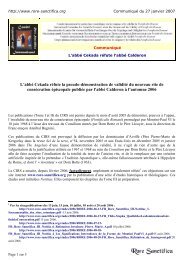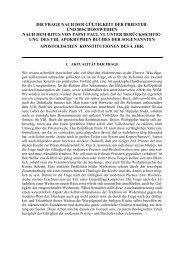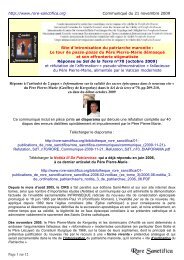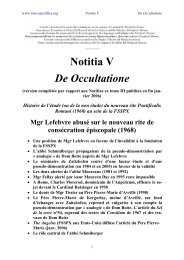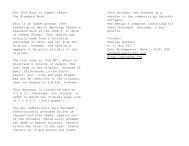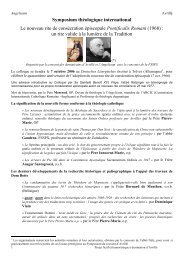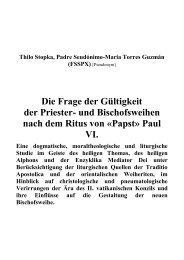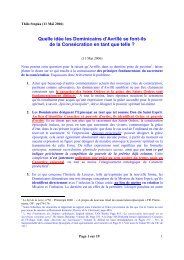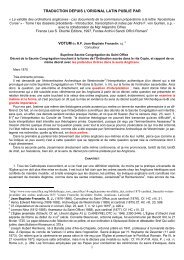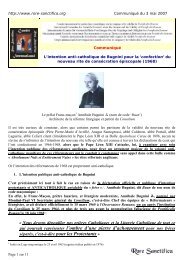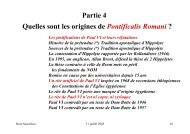THE ORDER OF MELCHISEDECH A Defence of ... - Rore Sanctifica
THE ORDER OF MELCHISEDECH A Defence of ... - Rore Sanctifica
THE ORDER OF MELCHISEDECH A Defence of ... - Rore Sanctifica
Create successful ePaper yourself
Turn your PDF publications into a flip-book with our unique Google optimized e-Paper software.
Chapter II<br />
The Protestant Position<br />
The basis <strong>of</strong> Protestant teaching lies not in affirming the common priesthood <strong>of</strong> all the faithful but<br />
in denying that there is a difference in essence between this common priesthood and the ministerial<br />
priesthood conferred by the Sacrament <strong>of</strong> Order. For a Protestant, ordination is simply a public<br />
ceremony in which an individual Christian is appointed to perform a particular function within the<br />
Church. There is no question <strong>of</strong> the ordained man (or woman) receiving new powers which he did<br />
not possess before. He is simply given the authority to exercise publicly an <strong>of</strong>fice for which he was<br />
already qualified in virtue <strong>of</strong> the common priesthood <strong>of</strong> all believers. Martin Luther has explained<br />
the Protestant position with admirable clarity:<br />
All <strong>of</strong> us alike are priests, and we all have the same authority in regard to the word and the<br />
sacraments, although no one has the right to administer them without the consent <strong>of</strong> the members <strong>of</strong><br />
his church, or by the call <strong>of</strong> the majority (because when something is common to all, no single<br />
person is empowered to arrogate it to himself but should await the call <strong>of</strong> the Church). 1<br />
Nor is it considered necessary for appointment to the ministry to be made by a bishop or even by an<br />
ordained man. Cranmer taught explicitly that "if it so fortuned that all the bishops and priests <strong>of</strong> a<br />
region were dead" then "the king <strong>of</strong> that region should make bishops and priests." 2 Over four<br />
hundred years later a Congregational minister insisted that ''as a matter <strong>of</strong> propriety and order, the<br />
pastor always presides at the Lord's Supper; but there is nothing in the New Testament to prevent a<br />
church from celebrating the Sacrament in the absence <strong>of</strong> its pastor." 3<br />
There is now considerable debate within the Anglican Communion as to whether laymen (and<br />
women) should be allowed to preside at Holy Communion. Prebendary Peter Johnson, the president<br />
<strong>of</strong> the Islington Conference (an association <strong>of</strong> Evangelical Anglicans), made the following request<br />
in his presidential address in February 1975: "I want to ask . . . that we give very serious<br />
consideration to the question <strong>of</strong> authorizing laymen to celebrate the Holy Communion." 4 In<br />
February 1976 he followed this up by saying: "I have been asked to elaborate on the subject, and I<br />
gladly do so. There is no indication in the New Testament as to who should be the celebrant at the<br />
Eucharist . . . I would wish to see a lay person, recommended by the incumbent (or Rural Dean) and<br />
also recommended by the P.C.C. as being acceptable to the congregation, duly authorized by the<br />
bishop to administer the Holy Communion (i.e. to celebrate the Eucharist) in the absence <strong>of</strong> the<br />
clergyman, and only in his home church." 5<br />
In an essay opposing the appointment <strong>of</strong> "lay-presidents", an Anglican theologian, Douglas Davies,<br />
lays stress on the fact that his opposition is in the interests <strong>of</strong> good order, and continues:<br />
To say this is not to adopt the Catholic notion <strong>of</strong> priestly character, the doctrine that in his<br />
ordination the priest receives specific power and authority from the ordaining bishop standing in a<br />
proper episcopal succession, for the proper celebration <strong>of</strong> the Mass . . . To permit lay celebration is,<br />
then, to allow disorder to enter the church community, to allow one not fully subject to the life <strong>of</strong><br />
minister to engage in the central activity <strong>of</strong> the gospel. Of course every believer has the right to do<br />
these things if so called by the church and the Spirit, the one publicly, the other privately. 6<br />
There is nothing novel in these views, which long predated the<br />
English Reformation and are found in the heresies <strong>of</strong> the Lollard sect. One <strong>of</strong> the articles for which<br />
John Browne and other heretics in Kent were condemned in 1511 was that "no power is given <strong>of</strong><br />
God to priests, <strong>of</strong> ministering Sacraments, saying Mass, or other private service more than to<br />
laymen." 7<br />
C In his magisterial work, The Question <strong>of</strong> Anglican Ordinations, Canon E. E. Estcourt has



